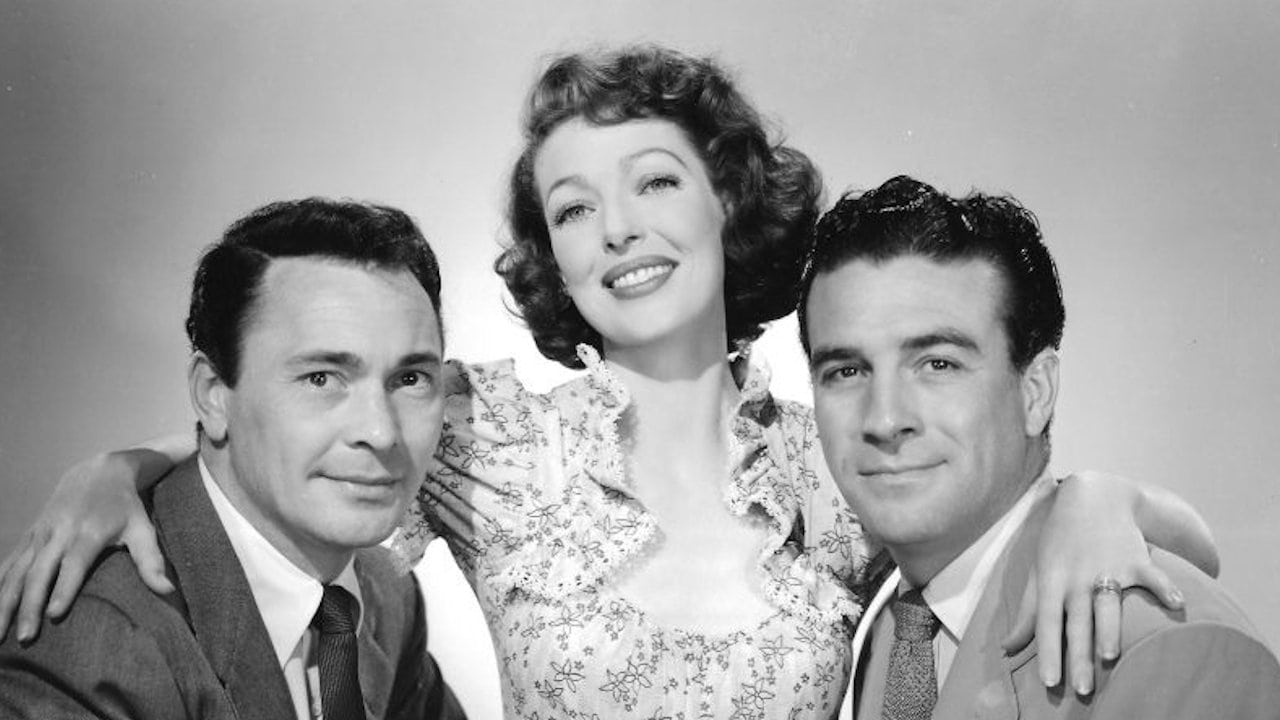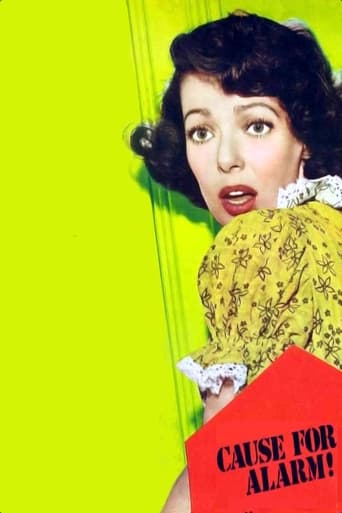



It is not only a funny movie, but it allows a great amount of joy for anyone who watches it.
View MoreWhat begins as a feel-good-human-interest story turns into a mystery, then a tragedy, and ultimately an outrage.
View MoreThere are moments that feel comical, some horrific, and some downright inspiring but the tonal shifts hardly matter as the end results come to a film that's perfect for this time.
View MoreExactly the movie you think it is, but not the movie you want it to be.
View MoreIt would have made a typical Alfred Hitchcock Presents episode. It LOOKS like a TV program. The lighting is flat, the production design unimaginative, the dialog functional, and the values are the standards of the 1950s.Not that it's entirely without interest, and it gets better as it develops a bit of steam. Housewife Loretta Young's narration ("It was all like a terrible dream") takes us back to war time when she met her Army Air Force husband, Barry Sullivan, and fell in love with him. (At first sight.) A mutual friend, a Navy officer, Bruce Cowling, watches the romance with disappointment and envy.Then Sullivan is laid up with a heart ailment. Young is kept busy keeping house and tending to him while he's in bed. She loves Sullivan but she really DOES crave a rose-covered cottage and children. The attending physician is their old friend, Cowling, who comes to wonder if Sullivan might benefit from a talk with a shrink. And well he might.Sullivan appears to be suffering from a psychiatric condition that in the older editions of the DSM was known as "paranoid state." (I speak to you now as your psychologist. That will be ten cents.) Paranoid state isn't found in the more recent literature but it's real enough. The victim doesn't run around shouting gibberish about the NSA being after him. He's perfectly normal when circumstances require it. The problem is that he carries around in his head a set of delusions that are out of kilter with reality, but he can connect enough dots to make them sound reasonable. A real story: One clinical psychologist picked up a hitch hiker. They had chatted amiably for more than half an hour before the shrink realized that he was dealing with someone suffering from a paranoid state. The condition is something like an encapsulated brain tumor except that instead of being filled with cancerous tissue, it's puffed up with delusions about enemies plotting against him. Sorry. Got carried away. The condition is at least as beguiling as the movie. In any case, Sullivan grows ever more nasty and later goes berserk, which isn't usually part of the clinical picture.Sullivan, like most of his ilk, has been hiding his delusions away, except that he's keeping a diary of all the evidence he's found of the plot between his wife and his doctor to do away with him for the insurance. "An hour ago they tried again." When Young finally talks him into taking his medicine, he's certain it's something that will do him harm, so he mails a lengthy letter to the District Attorney, names all the names, then he drops dead while trying to kill Young. However the guilty party is not the winsome Loretta Young nor the doctor, and their sinister plot but only the familiar winged chariot of time.The bulk of the movie consists of Young's frantic efforts to retrieve the delusional but incriminating letter from the mailman and the Post Office. It goes without saying that she runs into every obstacle imaginable. There are regulations upon regulations; there's a little kid she almost runs over in her race to the Post Office.Loretta Young gives an emphatic rendition of a woman who is hysterical with fear, sometimes too much. But it's all peacefully resolved when the doctor who has loved her from afar shows up and a previously overlooked postal regulation causes the letter to return. Young will no doubt marry the doctor, and it's all for the good. She'll get that rose-covered cottage -- a dozen of them if she likes -- because next to curing diseases docs are best at raking in shekels. Plus, they're away from home often enough that there aren't many arguments. And children? Why not.
View MoreAlthough this is what I think of as a "small" film, it nevertheless is a neat little thriller.A husband (Barry Sullivan) is suffering from a serious heart condition. His wife (Loretta Young) is doing her best to care for him at home. His doctor is an old family friend who once was interested in Young, himself. The husband is also having a nervous breakdown due to depression, and he begins to think his wife and doctor are intentionally making his condition worse so he will have a heart attack and die and they can run off together. The husband writes a letter to the district attorney, and then decides to kill his wife...but has a fatal heart attack in the process. But the letter is in the mail already. What will the wife do? What will happen to her? Loretta Young is quite good here, though this is past her prime in movies (and not too long before she would begin her popular television program). Sullivan is decent, although I never found him a very compelling actor. The rest of the cast does their job, but don't stand out in any way.One thing I really disliked about the film was how Sullivan met Young in one of the early scenes of the film. It just seemed foolish. On the other hand, I liked that in many ways this was a story about everyday life, not some exotic story. Some call this film noir...I disagree...although it is quite a good flick. Recommended...at least once.
View MoreThe premise sounded a bit far-fetched at first but upon further consideration, I think the story of a demented but cunning man wanting to frame his wife for his suicide could make a plausible movie even if it were set in current times (or at least an episode of CSI). Set in the 50's though, it all comes across as a tad too silly, when Loretta Young runs around pleading for the letter from whomever it's with. 5I'm not really a fan of Young's acting, probably because she's often pigeonholed as a put-upon wife, which is a pretty limited role. At least her Oscar win for The Farmer's Daughter for playing a Swedish-farmgirl- turned-congresswoman was quite deserved - it was a juicy part and she was great with it.
View MoreDecent enough thriller that nevertheless suffers a gap in exposition. In spite of reviewer Jacobfam's highly revealing analytic, the narrative jump from a healthy if quirky George (Sullivan) to a bed-ridden, full-blown paranoic is simply too visually abrupt to be convincing-- and this remains the case despite the clues that Jacobfam so brilliantly assembles. After all, this is a movie and not a literary assignment . The way the narrative stands, it's as if the producers wanted to get rid of co-star Sullivan as quickly as possible so the movie would become exclusively Young's. And admittedly, the last three-fourths do become hers, in spite of the shadow George casts.Where the film works well is showing how innocent daily occurrences transform into a pattern of guilt once suspicion takes over. Ellen (Young) sees the trap closing around her that George has so cleverly laid, but there is little she can do unless she retrieves that incriminating letter. It's that pursuit that generates audience involvement. It's simply one frustration after another—a pesky salesman, a nosy neighbor, but above all, a quirky mailman (Bacon), who are sealing her fate. The script cleverly turns the mailman into just the kind of character who would stand on an unthinking rule rather than a dose of common sense. Meanwhile, the letter floats tantalizingly just beyond her reach. Some reviewers fault Young's emotional performance during the pursuit. But put yourself in her place. Her whole life hangs in the balance because of that letter. Given what's at stake, her emotional pitch seems about right. In passing—Can't help noticing similarity between this film and 1952's Beware, My Lovely, both scripted by Mel Dinelli, and both concerning a housewife trapped by an unbalanced man. But, notice in Beware how well the unbalanced man's (Robert Ryan) background is visually sketched in. Unlike Cause, there are no developmental gaps, an inclusion that makes for a more persuasive and effective narrative. Also, I recall an episode of Hitchcock Presents where a woman frantically tries to retrieve an incriminating letter. But when the missive is returned for insufficient postage, a good Samaritan maid supplies the missing postage!-- A typical touch of Hitchcock irony. Anyway, Cause remains a decent, if flawed, 75 minutes of entertainment.
View More